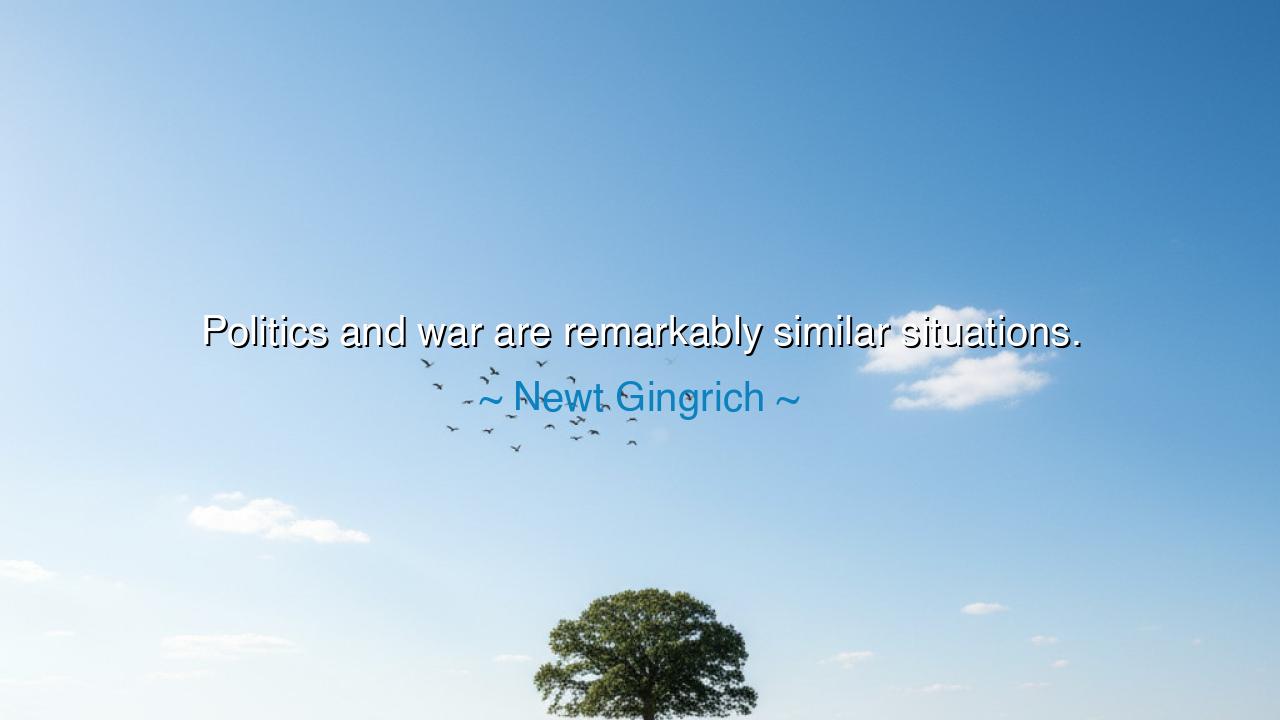
Politics and war are remarkably similar situations.






In the chronicles of human struggle, where nations rise and fall like waves upon the shore, there is a saying by Newt Gingrich: “Politics and war are remarkably similar situations.” These words, though uttered in our modern age, echo the ancient wisdom of generals, kings, and philosophers who long understood that the battlefield of steel and the battlefield of speech are but mirrors of one another. The weapons may differ—swords in one hand, words in the other—but the stakes remain the same: power, survival, and the shaping of destiny.
For what is politics, if not the subtle art of gaining advantage, forging alliances, and outmaneuvering foes without shedding blood? And what is war, if not politics stripped of its masks, a contest where words fail and armies take their place? Both demand strategy, patience, cunning, and the will to endure. In both, victory is seldom given to the strongest alone, but to the most disciplined, the most cunning, the most unyielding. Thus, the statesman and the general drink from the same fountain of wisdom, though their cups may differ.
History itself bears witness to this truth. Consider the tale of Julius Caesar, who first conquered with legions and then conquered with law. On the fields of Gaul, his strategy and daring brought Rome new provinces. But upon returning to the Eternal City, he faced a different kind of battlefield: the Senate, where daggers were words, and alliances meant survival. He crossed the Rubicon not merely as a soldier, but as a politician who knew that war and politics are two faces of the same coin. His triumphs in war gave him power in politics, and his failures in politics brought him death by war’s sharpest blade.
Yet let us not imagine that this truth belongs only to the distant past. In our own era, the Cold War revealed the same eternal pattern. No armies clashed in great battles between East and West, yet the world trembled under the shadow of annihilation. Here, politics became war by other means, fought with diplomacy, spies, propaganda, and the silent terror of nuclear arms. The strategies of generals were played out in conference rooms, and victories were measured not in captured cities, but in alliances formed, economies strengthened, and narratives believed. The battlefield had no trenches, yet it demanded the same discipline, vigilance, and resolve as any clash of armies.
The similarity lies in their shared demand for sacrifice. Both politics and war require loyalty, vision, and the ability to endure loss. Both test the human heart against temptation, corruption, and fear. And in both, those who fight without wisdom bring ruin not only upon themselves, but upon the countless lives they claim to serve. Thus the stakes are heavy, and those who step into either arena must be prepared to bear the weight of nations on their shoulders.
O seeker of wisdom, learn from these truths: whether you fight with words or with steel, you are called to strategy, patience, and honor. Do not mistake politics as a game of mere ambition, nor war as a contest of brute strength. Both are struggles for the soul of a people, and both demand the clarity of vision that sees beyond the moment into the destiny that lies ahead.
And so the lesson is this: in your own life, though you may never march in an army nor stand in the senate, you too face battles of politics and war. In your workplace, in your community, in your family even—there are struggles where diplomacy, patience, and strategy mean more than force. Choose your allies with care, weigh your words as a general weighs his battle plan, and know when to fight and when to hold peace. For those who master the balance of politics and war in the small arenas of life shall be prepared when greater trials come.
Thus, remember: the sword and the tongue are kin, and the victory of either depends not on the weapon, but on the wisdom of the one who wields it. Walk, therefore, with caution, with courage, and with purpose—for every choice you make is part of the eternal war that shapes your destiny.






AAdministratorAdministrator
Welcome, honored guests. Please leave a comment, we will respond soon